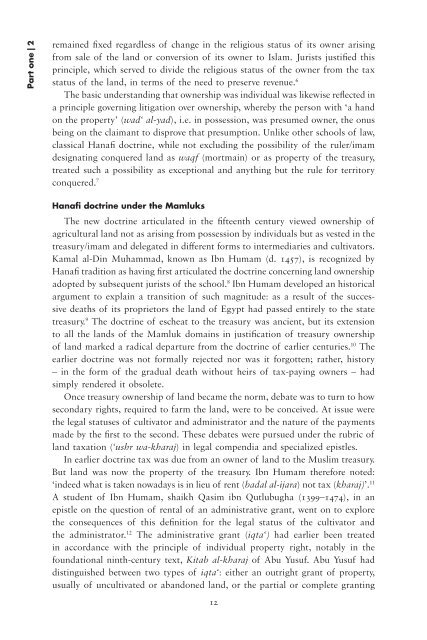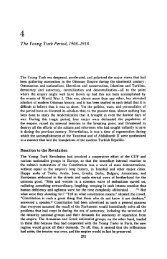Governing property, making the modern state - PSI424
Governing property, making the modern state - PSI424
Governing property, making the modern state - PSI424
You also want an ePaper? Increase the reach of your titles
YUMPU automatically turns print PDFs into web optimized ePapers that Google loves.
Part one | 2<br />
remained fixed regardless of change in <strong>the</strong> religious status of its owner arising<br />
from sale of <strong>the</strong> land or conversion of its owner to Islam. Jurists justified this<br />
principle, which served to divide <strong>the</strong> religious status of <strong>the</strong> owner from <strong>the</strong> tax<br />
status of <strong>the</strong> land, in terms of <strong>the</strong> need to preserve revenue. 6<br />
The basic understanding that ownership was individual was likewise reflected in<br />
a principle governing litigation over ownership, whereby <strong>the</strong> person with ‘a hand<br />
on <strong>the</strong> <strong>property</strong>’ (wad‘ al-yad), i.e. in possession, was presumed owner, <strong>the</strong> onus<br />
being on <strong>the</strong> claimant to disprove that presumption. Unlike o<strong>the</strong>r schools of law,<br />
classical Hanafi doctrine, while not excluding <strong>the</strong> possibility of <strong>the</strong> ruler/imam<br />
designating conquered land as waqf (mortmain) or as <strong>property</strong> of <strong>the</strong> treasury,<br />
treated such a possibility as exceptional and anything but <strong>the</strong> rule for territory<br />
conquered. 7<br />
Hanafi doctrine under <strong>the</strong> Mamluks<br />
The new doctrine articulated in <strong>the</strong> fifteenth century viewed ownership of<br />
agricultural land not as arising from possession by individuals but as vested in <strong>the</strong><br />
treasury/imam and delegated in different forms to intermediaries and cultivators.<br />
Kamal al-Din Muhammad, known as Ibn Humam (d. 1457), is recognized by<br />
Hanafi tradition as having first articulated <strong>the</strong> doctrine concerning land ownership<br />
adopted by subsequent jurists of <strong>the</strong> school. 8 Ibn Humam developed an historical<br />
argument to explain a transition of such magnitude: as a result of <strong>the</strong> successive<br />
deaths of its proprietors <strong>the</strong> land of Egypt had passed entirely to <strong>the</strong> <strong>state</strong><br />
treasury. 9 The doctrine of escheat to <strong>the</strong> treasury was ancient, but its extension<br />
to all <strong>the</strong> lands of <strong>the</strong> Mamluk domains in justification of treasury ownership<br />
of land marked a radical departure from <strong>the</strong> doctrine of earlier centuries. 10 The<br />
earlier doctrine was not formally rejected nor was it forgotten; ra<strong>the</strong>r, history<br />
– in <strong>the</strong> form of <strong>the</strong> gradual death without heirs of tax-paying owners – had<br />
simply rendered it obsolete.<br />
Once treasury ownership of land became <strong>the</strong> norm, debate was to turn to how<br />
secondary rights, required to farm <strong>the</strong> land, were to be conceived. At issue were<br />
<strong>the</strong> legal statuses of cultivator and administrator and <strong>the</strong> nature of <strong>the</strong> payments<br />
made by <strong>the</strong> first to <strong>the</strong> second. These debates were pursued under <strong>the</strong> rubric of<br />
land taxation (‘ushr wa-kharaj) in legal compendia and specialized epistles.<br />
In earlier doctrine tax was due from an owner of land to <strong>the</strong> Muslim treasury.<br />
But land was now <strong>the</strong> <strong>property</strong> of <strong>the</strong> treasury. Ibn Humam <strong>the</strong>refore noted:<br />
‘indeed what is taken nowadays is in lieu of rent (badal al-ijara) not tax (kharaj)’. 11<br />
A student of Ibn Humam, shaikh Qasim ibn Qutlubugha (1399–1474), in an<br />
epistle on <strong>the</strong> question of rental of an administrative grant, went on to explore<br />
<strong>the</strong> consequences of this definition for <strong>the</strong> legal status of <strong>the</strong> cultivator and<br />
<strong>the</strong> administrator. 12 The administrative grant (iqta‘) had earlier been treated<br />
in accordance with <strong>the</strong> principle of individual <strong>property</strong> right, notably in <strong>the</strong><br />
foundational ninth-century text, Kitab al-kharaj of Abu Yusuf. Abu Yusuf had<br />
distinguished between two types of iqta‘: ei<strong>the</strong>r an outright grant of <strong>property</strong>,<br />
usually of uncultivated or abandoned land, or <strong>the</strong> partial or complete granting<br />
12












